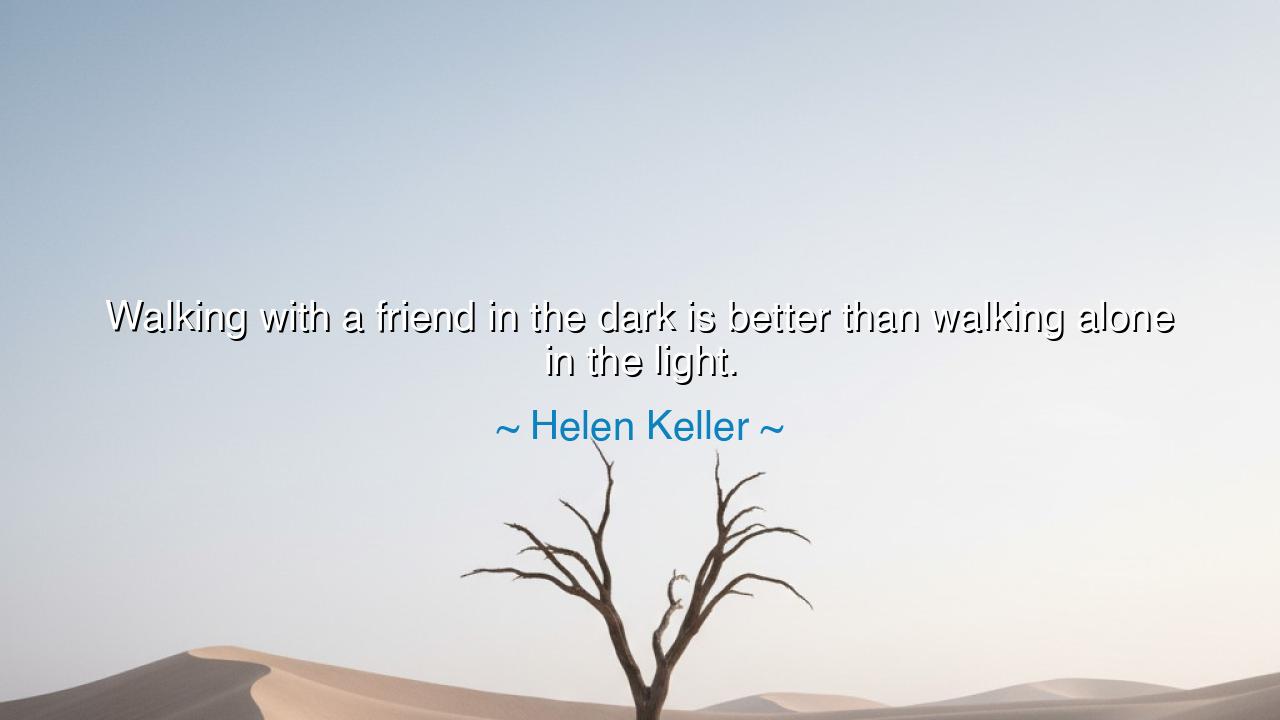
Walking with a friend in the dark is better than walking alone in






When Helen Keller said, “Walking with a friend in the dark is better than walking alone in the light,” she spoke from the depths of a soul that knew both darkness and illumination — not of the eyes, but of the spirit. Blind and deaf from infancy, Keller understood what it meant to dwell in literal shadow. Yet she also knew that friendship, born of love and understanding, could kindle a light far brighter than the sun. In her words lies an ancient and enduring truth: that companionship, founded upon trust and compassion, gives life its deepest meaning. To share the darkness with another is to discover that no night is truly without stars.
The origin of these words springs from Keller’s own life — a life shaped by struggle, perseverance, and the guiding hand of Anne Sullivan, her devoted teacher and friend. Before Anne came into her life, Helen lived in a world of silence and confusion, cut off from the voices and sights that weave human connection. But when Anne reached her hand into Helen’s world and taught her the language of touch, she brought not only knowledge but light. Through this friendship, Keller learned that love can pierce any darkness, that understanding can create its own dawn. When she later said that walking with a friend in the dark was better than walking alone in the light, she was not speaking in metaphor only — she was bearing witness to her own salvation.
In these words, we find a reflection of the ancient human truth: that companionship is stronger than circumstance. Throughout history, men and women have faced darkness — the darkness of grief, of fear, of failure — yet those who had a friend beside them were never truly lost. Consider the tale of Gilgamesh and Enkidu, the heroes of the world’s oldest epic. Gilgamesh, mighty and proud, could conquer any foe, but his soul was barren until he found friendship in Enkidu. Together they faced monsters and gods, but when Enkidu died, Gilgamesh’s heart was shattered, and he learned that power is nothing beside love. The gods themselves, the ancients said, envy human friendship, for it makes mortals divine.
Keller’s words also speak of the paradox that light alone does not guarantee joy, nor does darkness ensure despair. Many walk in the “light” — surrounded by comfort, wealth, or admiration — yet they feel the chill of solitude. Others, though burdened by hardship, find warmth in companionship. The true light of life, Keller teaches, is not external — it shines from the heart of love. When a friend shares our sorrow, the darkness loses its terror; when a friend rejoices with us, the light grows twice as bright. Thus, to walk “in the dark” with a friend is to walk in the glow of something higher than sight — the light of the soul.
There is also humility in her teaching. To “walk with a friend in the dark” means not to lead or to follow, but to walk together, step by step, bound by mutual faith. Keller, who depended on Anne Sullivan’s guidance, never spoke of her friend as a master but as a companion — an equal in spirit. Their relationship was a model of human interdependence, of how the weak and the strong, the teacher and the learner, the guide and the guided, become one in purpose. It is a lesson that the world too easily forgets: that no one, however wise or capable, is meant to walk alone.
In this way, Keller’s words reach beyond personal friendship to touch the heart of community itself. Civilizations rise not through brilliance or power alone, but through solidarity — through people willing to stand beside one another in the shadows of adversity. The great reformers, saints, and heroes of the world all walked with others: Martin Luther King Jr. with his followers in the struggle for justice, Florence Nightingale with her nurses in the wards of suffering, Mahatma Gandhi with his people in peaceful defiance. The “darkness” they faced was immense — oppression, ignorance, and fear — but together, they made that darkness glow with purpose.
So, my children, take this teaching to heart: seek not only the light, but the companionship that makes darkness bearable. When the night of sorrow or uncertainty descends, reach out your hand to another — not to be led, but to walk together. And when you find yourself in the light, do not walk proudly alone, for light without love is only another kind of blindness. Learn from Helen Keller, who could not see the dawn, yet lived bathed in its warmth, because she found a soul who walked beside her.
For in the end, it is not the light that saves us, but the love that walks with us through the dark. The road of life is long, and shadows will come — but if your hand is clasped in friendship, you will never lose your way.






AAdministratorAdministrator
Welcome, honored guests. Please leave a comment, we will respond soon